LW302 - Discussing EU Competition Law and Consumer Welfare
VerifiedAdded on 2022/08/08
|11
|2956
|32
Essay
AI Summary
This essay examines the significance of EU competition law, specifically focusing on its benefits to consumers and its contribution to the achievement and preservation of the internal market. The analysis centers on Articles 101 and 102 of the Treaty on the Functioning of the European Union (TFEU), which address anti-competitive agreements and the abuse of dominant market positions, respectively. The essay delves into the core principles of EU competition law, including the prohibition of cartels, the regulation of mergers and acquisitions, and the prevention of market dominance. It explores how these legal frameworks aim to promote fair competition and safeguard consumer welfare, as evidenced by landmark cases such as Consten SaRL and Grundig GmbH v Commission, United Brands v Commission, Gencor Ltd V Commission, Airtours plc v. Commission, Deutsche Telekom v Commission, Hoffmann-La Roche & Co. AG v Commission of the European Communities, and T-Mobile Netherlands BV v Raad van bestuur van de Nederlandse Mededingingsautoriteit, Post Danmark A/S v Konkurrencerådet. The essay highlights the evolution of consumer welfare considerations within EU competition law, emphasizing the importance of ensuring that competition benefits consumers in terms of quality, price, and innovation, particularly within the context of the digital economy. It concludes by underscoring the vital role of EU competition law in fostering a competitive market structure and protecting both immediate and latent consumer interests, thereby contributing to the overall economic well-being of the European Union.
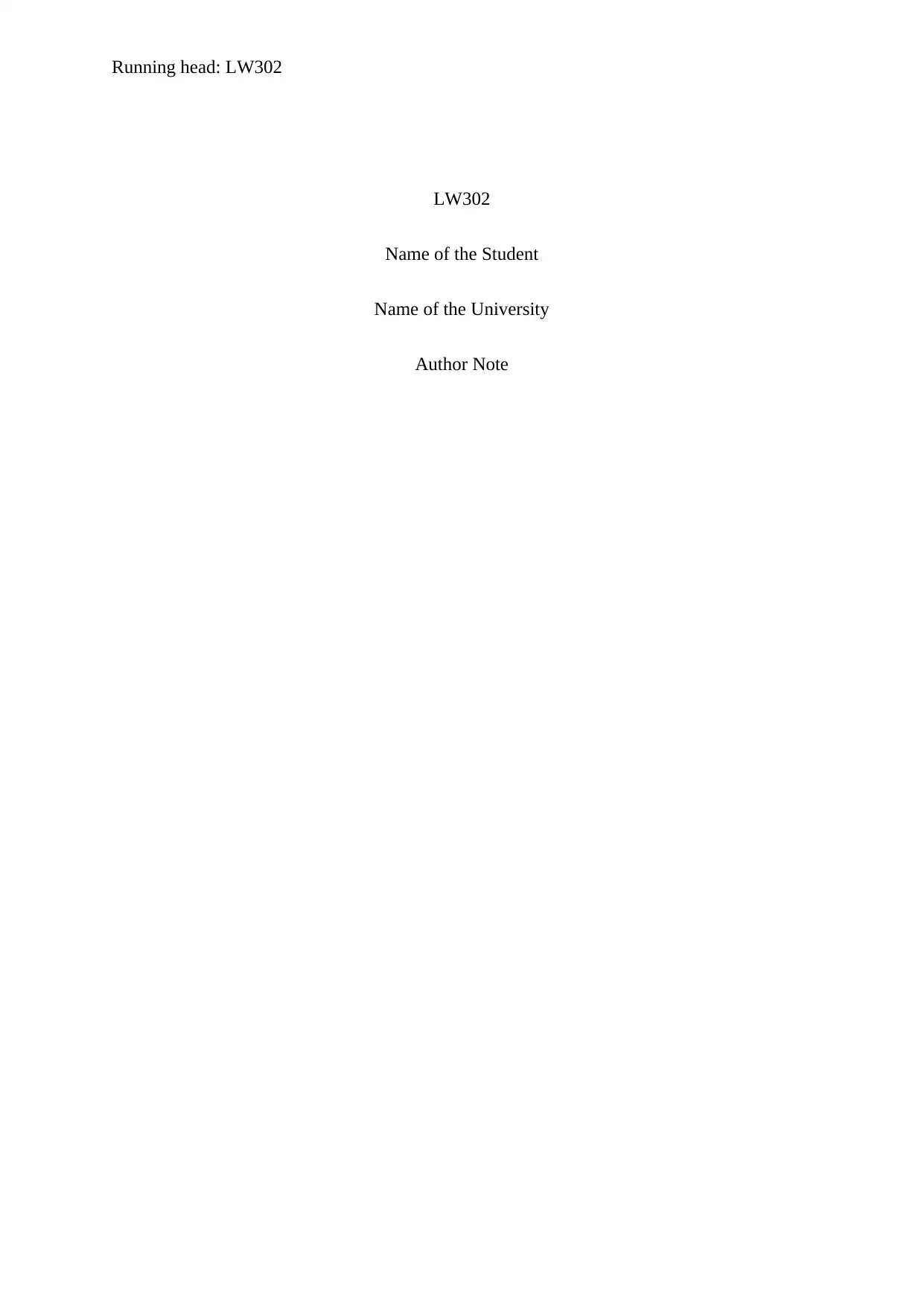
Running head: LW302
LW302
Name of the Student
Name of the University
Author Note
LW302
Name of the Student
Name of the University
Author Note
Paraphrase This Document
Need a fresh take? Get an instant paraphrase of this document with our AI Paraphraser
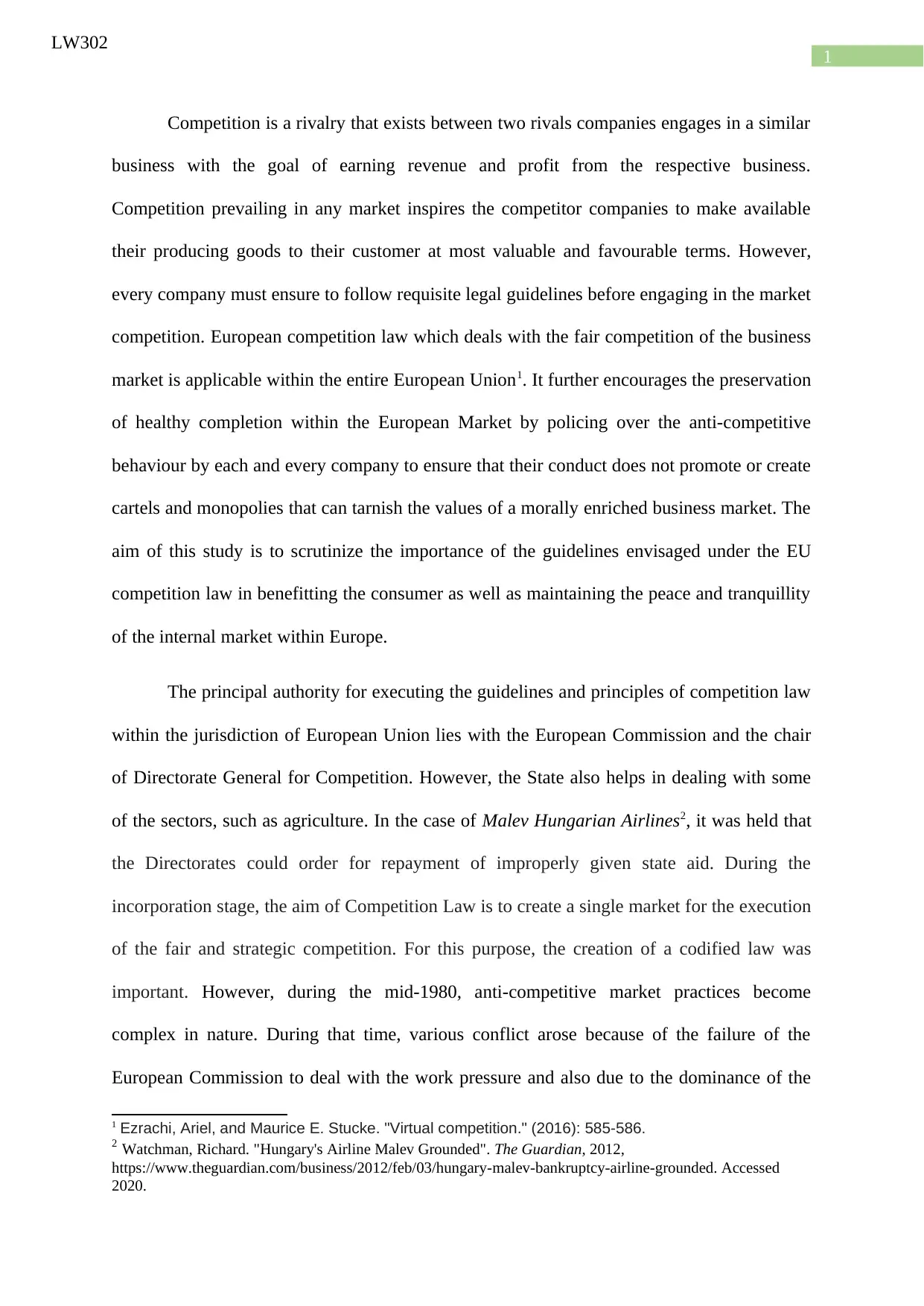
1
LW302
Competition is a rivalry that exists between two rivals companies engages in a similar
business with the goal of earning revenue and profit from the respective business.
Competition prevailing in any market inspires the competitor companies to make available
their producing goods to their customer at most valuable and favourable terms. However,
every company must ensure to follow requisite legal guidelines before engaging in the market
competition. European competition law which deals with the fair competition of the business
market is applicable within the entire European Union1. It further encourages the preservation
of healthy completion within the European Market by policing over the anti-competitive
behaviour by each and every company to ensure that their conduct does not promote or create
cartels and monopolies that can tarnish the values of a morally enriched business market. The
aim of this study is to scrutinize the importance of the guidelines envisaged under the EU
competition law in benefitting the consumer as well as maintaining the peace and tranquillity
of the internal market within Europe.
The principal authority for executing the guidelines and principles of competition law
within the jurisdiction of European Union lies with the European Commission and the chair
of Directorate General for Competition. However, the State also helps in dealing with some
of the sectors, such as agriculture. In the case of Malev Hungarian Airlines2, it was held that
the Directorates could order for repayment of improperly given state aid. During the
incorporation stage, the aim of Competition Law is to create a single market for the execution
of the fair and strategic competition. For this purpose, the creation of a codified law was
important. However, during the mid-1980, anti-competitive market practices become
complex in nature. During that time, various conflict arose because of the failure of the
European Commission to deal with the work pressure and also due to the dominance of the
1 Ezrachi, Ariel, and Maurice E. Stucke. "Virtual competition." (2016): 585-586.
2 Watchman, Richard. "Hungary's Airline Malev Grounded". The Guardian, 2012,
https://www.theguardian.com/business/2012/feb/03/hungary-malev-bankruptcy-airline-grounded. Accessed
2020.
LW302
Competition is a rivalry that exists between two rivals companies engages in a similar
business with the goal of earning revenue and profit from the respective business.
Competition prevailing in any market inspires the competitor companies to make available
their producing goods to their customer at most valuable and favourable terms. However,
every company must ensure to follow requisite legal guidelines before engaging in the market
competition. European competition law which deals with the fair competition of the business
market is applicable within the entire European Union1. It further encourages the preservation
of healthy completion within the European Market by policing over the anti-competitive
behaviour by each and every company to ensure that their conduct does not promote or create
cartels and monopolies that can tarnish the values of a morally enriched business market. The
aim of this study is to scrutinize the importance of the guidelines envisaged under the EU
competition law in benefitting the consumer as well as maintaining the peace and tranquillity
of the internal market within Europe.
The principal authority for executing the guidelines and principles of competition law
within the jurisdiction of European Union lies with the European Commission and the chair
of Directorate General for Competition. However, the State also helps in dealing with some
of the sectors, such as agriculture. In the case of Malev Hungarian Airlines2, it was held that
the Directorates could order for repayment of improperly given state aid. During the
incorporation stage, the aim of Competition Law is to create a single market for the execution
of the fair and strategic competition. For this purpose, the creation of a codified law was
important. However, during the mid-1980, anti-competitive market practices become
complex in nature. During that time, various conflict arose because of the failure of the
European Commission to deal with the work pressure and also due to the dominance of the
1 Ezrachi, Ariel, and Maurice E. Stucke. "Virtual competition." (2016): 585-586.
2 Watchman, Richard. "Hungary's Airline Malev Grounded". The Guardian, 2012,
https://www.theguardian.com/business/2012/feb/03/hungary-malev-bankruptcy-airline-grounded. Accessed
2020.
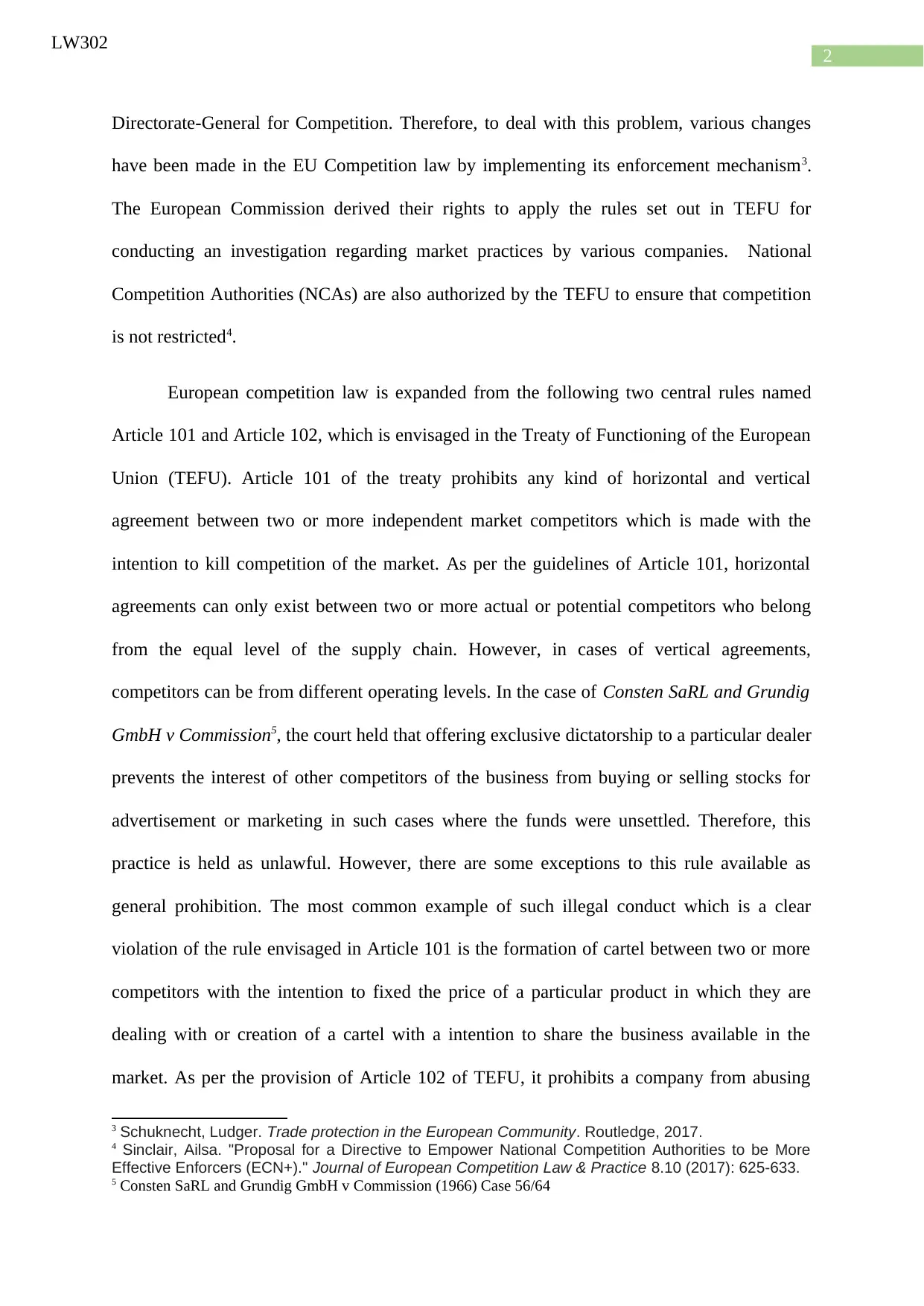
2
LW302
Directorate-General for Competition. Therefore, to deal with this problem, various changes
have been made in the EU Competition law by implementing its enforcement mechanism3.
The European Commission derived their rights to apply the rules set out in TEFU for
conducting an investigation regarding market practices by various companies. National
Competition Authorities (NCAs) are also authorized by the TEFU to ensure that competition
is not restricted4.
European competition law is expanded from the following two central rules named
Article 101 and Article 102, which is envisaged in the Treaty of Functioning of the European
Union (TEFU). Article 101 of the treaty prohibits any kind of horizontal and vertical
agreement between two or more independent market competitors which is made with the
intention to kill competition of the market. As per the guidelines of Article 101, horizontal
agreements can only exist between two or more actual or potential competitors who belong
from the equal level of the supply chain. However, in cases of vertical agreements,
competitors can be from different operating levels. In the case of Consten SaRL and Grundig
GmbH v Commission5, the court held that offering exclusive dictatorship to a particular dealer
prevents the interest of other competitors of the business from buying or selling stocks for
advertisement or marketing in such cases where the funds were unsettled. Therefore, this
practice is held as unlawful. However, there are some exceptions to this rule available as
general prohibition. The most common example of such illegal conduct which is a clear
violation of the rule envisaged in Article 101 is the formation of cartel between two or more
competitors with the intention to fixed the price of a particular product in which they are
dealing with or creation of a cartel with a intention to share the business available in the
market. As per the provision of Article 102 of TEFU, it prohibits a company from abusing
3 Schuknecht, Ludger. Trade protection in the European Community. Routledge, 2017.
4 Sinclair, Ailsa. "Proposal for a Directive to Empower National Competition Authorities to be More
Effective Enforcers (ECN+)." Journal of European Competition Law & Practice 8.10 (2017): 625-633.
5 Consten SaRL and Grundig GmbH v Commission (1966) Case 56/64
LW302
Directorate-General for Competition. Therefore, to deal with this problem, various changes
have been made in the EU Competition law by implementing its enforcement mechanism3.
The European Commission derived their rights to apply the rules set out in TEFU for
conducting an investigation regarding market practices by various companies. National
Competition Authorities (NCAs) are also authorized by the TEFU to ensure that competition
is not restricted4.
European competition law is expanded from the following two central rules named
Article 101 and Article 102, which is envisaged in the Treaty of Functioning of the European
Union (TEFU). Article 101 of the treaty prohibits any kind of horizontal and vertical
agreement between two or more independent market competitors which is made with the
intention to kill competition of the market. As per the guidelines of Article 101, horizontal
agreements can only exist between two or more actual or potential competitors who belong
from the equal level of the supply chain. However, in cases of vertical agreements,
competitors can be from different operating levels. In the case of Consten SaRL and Grundig
GmbH v Commission5, the court held that offering exclusive dictatorship to a particular dealer
prevents the interest of other competitors of the business from buying or selling stocks for
advertisement or marketing in such cases where the funds were unsettled. Therefore, this
practice is held as unlawful. However, there are some exceptions to this rule available as
general prohibition. The most common example of such illegal conduct which is a clear
violation of the rule envisaged in Article 101 is the formation of cartel between two or more
competitors with the intention to fixed the price of a particular product in which they are
dealing with or creation of a cartel with a intention to share the business available in the
market. As per the provision of Article 102 of TEFU, it prohibits a company from abusing
3 Schuknecht, Ludger. Trade protection in the European Community. Routledge, 2017.
4 Sinclair, Ailsa. "Proposal for a Directive to Empower National Competition Authorities to be More
Effective Enforcers (ECN+)." Journal of European Competition Law & Practice 8.10 (2017): 625-633.
5 Consten SaRL and Grundig GmbH v Commission (1966) Case 56/64
⊘ This is a preview!⊘
Do you want full access?
Subscribe today to unlock all pages.

Trusted by 1+ million students worldwide
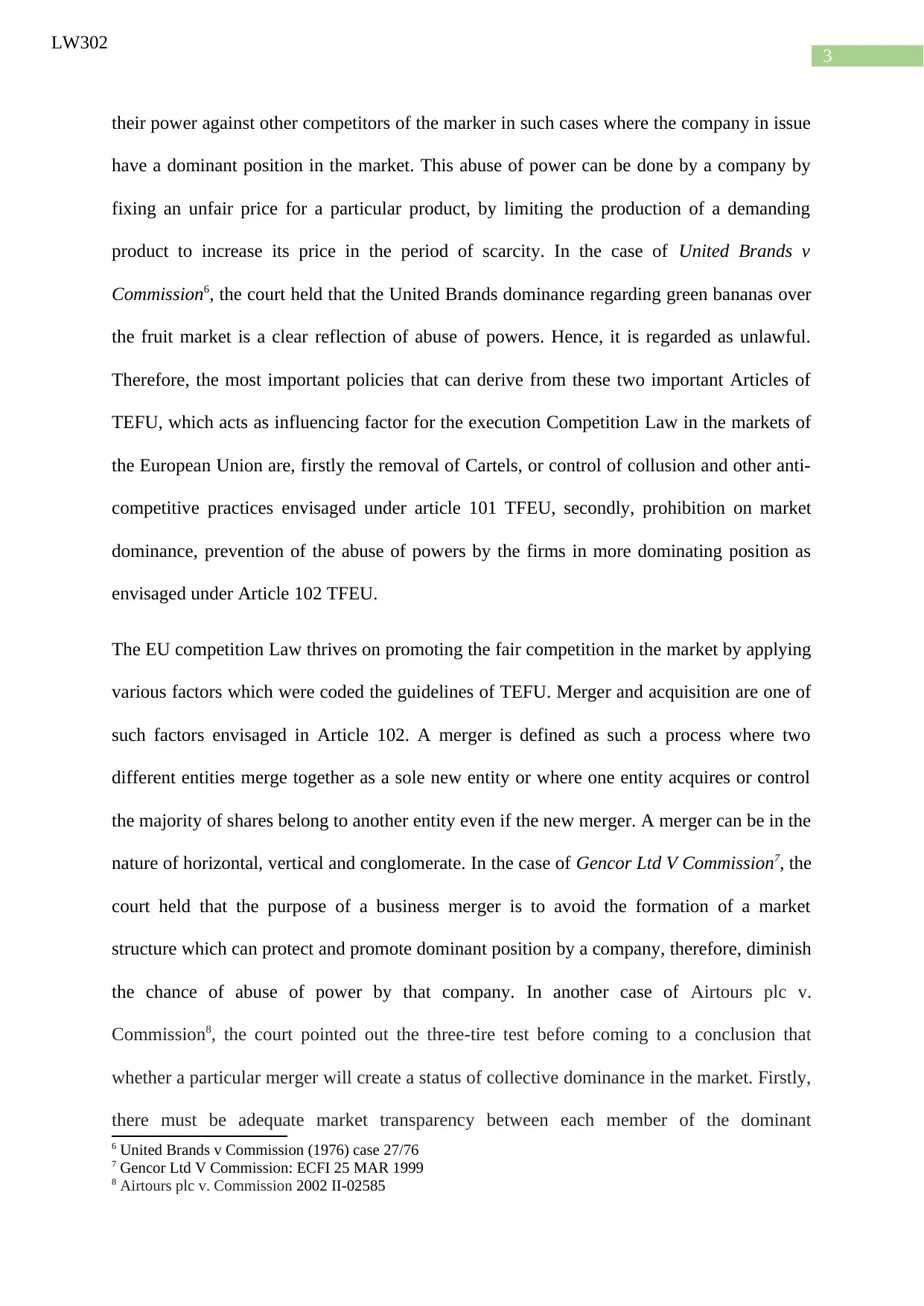
3
LW302
their power against other competitors of the marker in such cases where the company in issue
have a dominant position in the market. This abuse of power can be done by a company by
fixing an unfair price for a particular product, by limiting the production of a demanding
product to increase its price in the period of scarcity. In the case of United Brands v
Commission6, the court held that the United Brands dominance regarding green bananas over
the fruit market is a clear reflection of abuse of powers. Hence, it is regarded as unlawful.
Therefore, the most important policies that can derive from these two important Articles of
TEFU, which acts as influencing factor for the execution Competition Law in the markets of
the European Union are, firstly the removal of Cartels, or control of collusion and other anti-
competitive practices envisaged under article 101 TFEU, secondly, prohibition on market
dominance, prevention of the abuse of powers by the firms in more dominating position as
envisaged under Article 102 TFEU.
The EU competition Law thrives on promoting the fair competition in the market by applying
various factors which were coded the guidelines of TEFU. Merger and acquisition are one of
such factors envisaged in Article 102. A merger is defined as such a process where two
different entities merge together as a sole new entity or where one entity acquires or control
the majority of shares belong to another entity even if the new merger. A merger can be in the
nature of horizontal, vertical and conglomerate. In the case of Gencor Ltd V Commission7, the
court held that the purpose of a business merger is to avoid the formation of a market
structure which can protect and promote dominant position by a company, therefore, diminish
the chance of abuse of power by that company. In another case of Airtours plc v.
Commission8, the court pointed out the three-tire test before coming to a conclusion that
whether a particular merger will create a status of collective dominance in the market. Firstly,
there must be adequate market transparency between each member of the dominant
6 United Brands v Commission (1976) case 27/76
7 Gencor Ltd V Commission: ECFI 25 MAR 1999
8 Airtours plc v. Commission 2002 II-02585
LW302
their power against other competitors of the marker in such cases where the company in issue
have a dominant position in the market. This abuse of power can be done by a company by
fixing an unfair price for a particular product, by limiting the production of a demanding
product to increase its price in the period of scarcity. In the case of United Brands v
Commission6, the court held that the United Brands dominance regarding green bananas over
the fruit market is a clear reflection of abuse of powers. Hence, it is regarded as unlawful.
Therefore, the most important policies that can derive from these two important Articles of
TEFU, which acts as influencing factor for the execution Competition Law in the markets of
the European Union are, firstly the removal of Cartels, or control of collusion and other anti-
competitive practices envisaged under article 101 TFEU, secondly, prohibition on market
dominance, prevention of the abuse of powers by the firms in more dominating position as
envisaged under Article 102 TFEU.
The EU competition Law thrives on promoting the fair competition in the market by applying
various factors which were coded the guidelines of TEFU. Merger and acquisition are one of
such factors envisaged in Article 102. A merger is defined as such a process where two
different entities merge together as a sole new entity or where one entity acquires or control
the majority of shares belong to another entity even if the new merger. A merger can be in the
nature of horizontal, vertical and conglomerate. In the case of Gencor Ltd V Commission7, the
court held that the purpose of a business merger is to avoid the formation of a market
structure which can protect and promote dominant position by a company, therefore, diminish
the chance of abuse of power by that company. In another case of Airtours plc v.
Commission8, the court pointed out the three-tire test before coming to a conclusion that
whether a particular merger will create a status of collective dominance in the market. Firstly,
there must be adequate market transparency between each member of the dominant
6 United Brands v Commission (1976) case 27/76
7 Gencor Ltd V Commission: ECFI 25 MAR 1999
8 Airtours plc v. Commission 2002 II-02585
Paraphrase This Document
Need a fresh take? Get an instant paraphrase of this document with our AI Paraphraser
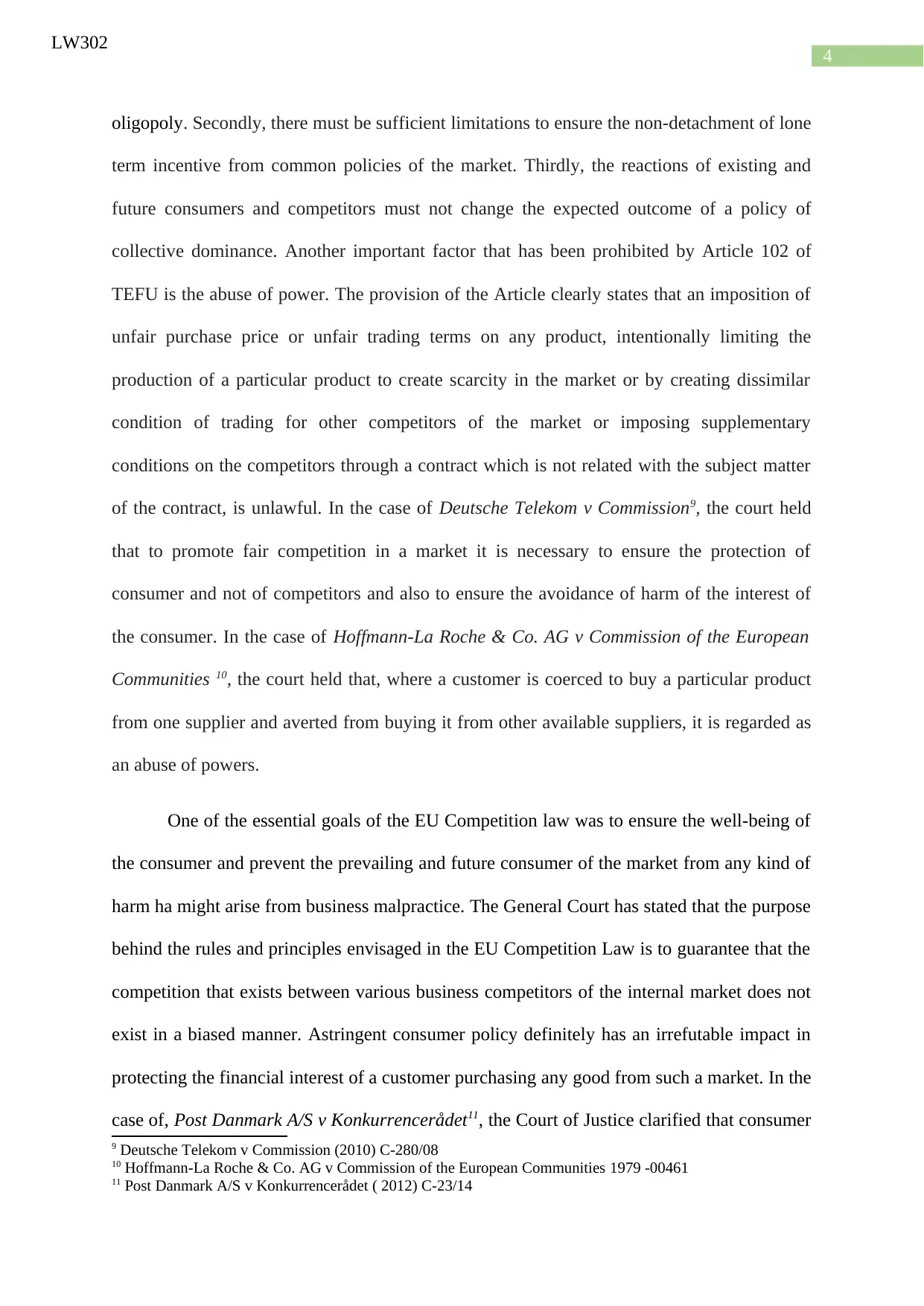
4
LW302
oligopoly. Secondly, there must be sufficient limitations to ensure the non-detachment of lone
term incentive from common policies of the market. Thirdly, the reactions of existing and
future consumers and competitors must not change the expected outcome of a policy of
collective dominance. Another important factor that has been prohibited by Article 102 of
TEFU is the abuse of power. The provision of the Article clearly states that an imposition of
unfair purchase price or unfair trading terms on any product, intentionally limiting the
production of a particular product to create scarcity in the market or by creating dissimilar
condition of trading for other competitors of the market or imposing supplementary
conditions on the competitors through a contract which is not related with the subject matter
of the contract, is unlawful. In the case of Deutsche Telekom v Commission9, the court held
that to promote fair competition in a market it is necessary to ensure the protection of
consumer and not of competitors and also to ensure the avoidance of harm of the interest of
the consumer. In the case of Hoffmann-La Roche & Co. AG v Commission of the European
Communities 10, the court held that, where a customer is coerced to buy a particular product
from one supplier and averted from buying it from other available suppliers, it is regarded as
an abuse of powers.
One of the essential goals of the EU Competition law was to ensure the well-being of
the consumer and prevent the prevailing and future consumer of the market from any kind of
harm ha might arise from business malpractice. The General Court has stated that the purpose
behind the rules and principles envisaged in the EU Competition Law is to guarantee that the
competition that exists between various business competitors of the internal market does not
exist in a biased manner. Astringent consumer policy definitely has an irrefutable impact in
protecting the financial interest of a customer purchasing any good from such a market. In the
case of, Post Danmark A/S v Konkurrencerådet11, the Court of Justice clarified that consumer
9 Deutsche Telekom v Commission (2010) C-280/08
10 Hoffmann-La Roche & Co. AG v Commission of the European Communities 1979 -00461
11 Post Danmark A/S v Konkurrencerådet ( 2012) C-23/14
LW302
oligopoly. Secondly, there must be sufficient limitations to ensure the non-detachment of lone
term incentive from common policies of the market. Thirdly, the reactions of existing and
future consumers and competitors must not change the expected outcome of a policy of
collective dominance. Another important factor that has been prohibited by Article 102 of
TEFU is the abuse of power. The provision of the Article clearly states that an imposition of
unfair purchase price or unfair trading terms on any product, intentionally limiting the
production of a particular product to create scarcity in the market or by creating dissimilar
condition of trading for other competitors of the market or imposing supplementary
conditions on the competitors through a contract which is not related with the subject matter
of the contract, is unlawful. In the case of Deutsche Telekom v Commission9, the court held
that to promote fair competition in a market it is necessary to ensure the protection of
consumer and not of competitors and also to ensure the avoidance of harm of the interest of
the consumer. In the case of Hoffmann-La Roche & Co. AG v Commission of the European
Communities 10, the court held that, where a customer is coerced to buy a particular product
from one supplier and averted from buying it from other available suppliers, it is regarded as
an abuse of powers.
One of the essential goals of the EU Competition law was to ensure the well-being of
the consumer and prevent the prevailing and future consumer of the market from any kind of
harm ha might arise from business malpractice. The General Court has stated that the purpose
behind the rules and principles envisaged in the EU Competition Law is to guarantee that the
competition that exists between various business competitors of the internal market does not
exist in a biased manner. Astringent consumer policy definitely has an irrefutable impact in
protecting the financial interest of a customer purchasing any good from such a market. In the
case of, Post Danmark A/S v Konkurrencerådet11, the Court of Justice clarified that consumer
9 Deutsche Telekom v Commission (2010) C-280/08
10 Hoffmann-La Roche & Co. AG v Commission of the European Communities 1979 -00461
11 Post Danmark A/S v Konkurrencerådet ( 2012) C-23/14
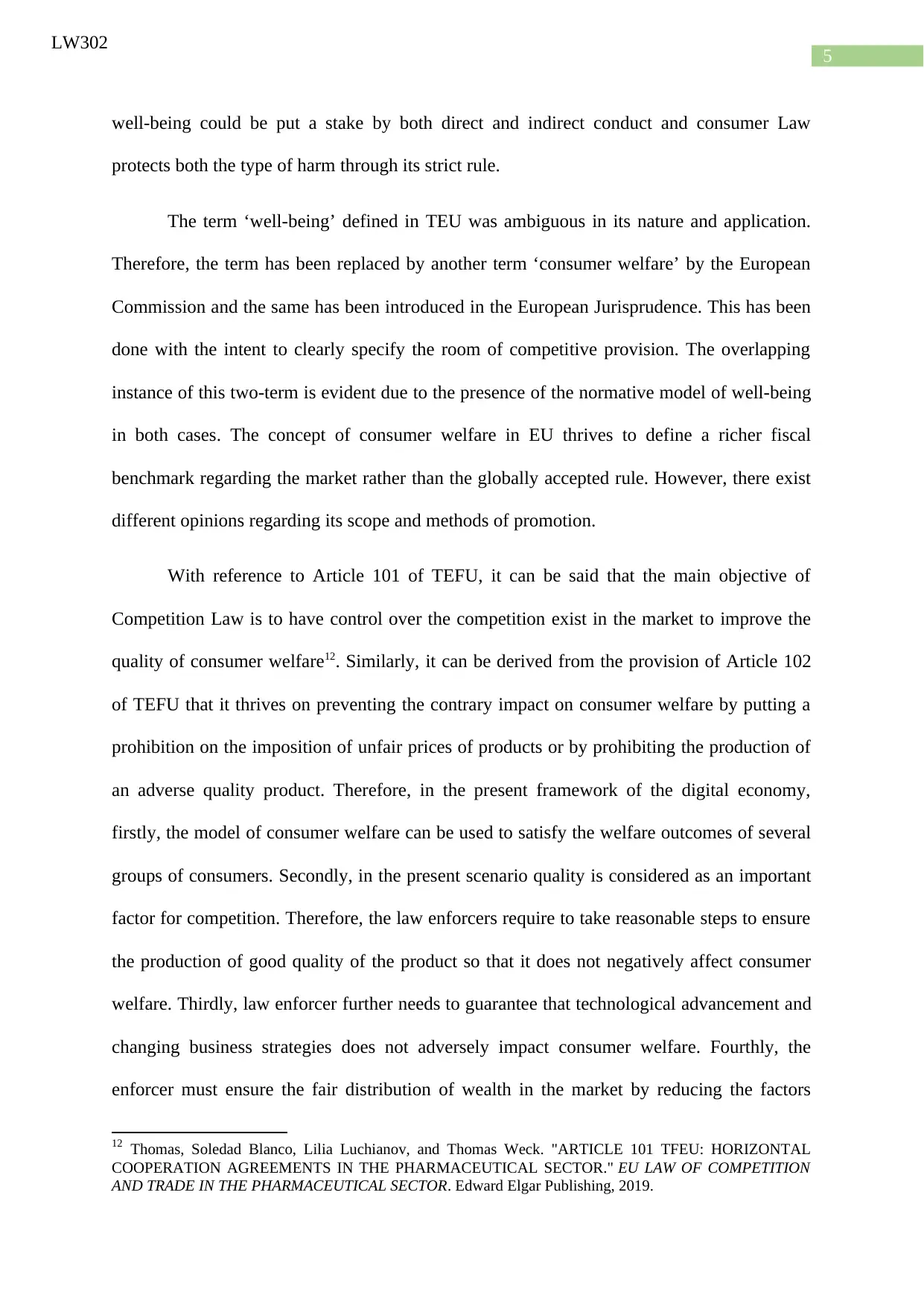
5
LW302
well-being could be put a stake by both direct and indirect conduct and consumer Law
protects both the type of harm through its strict rule.
The term ‘well-being’ defined in TEU was ambiguous in its nature and application.
Therefore, the term has been replaced by another term ‘consumer welfare’ by the European
Commission and the same has been introduced in the European Jurisprudence. This has been
done with the intent to clearly specify the room of competitive provision. The overlapping
instance of this two-term is evident due to the presence of the normative model of well-being
in both cases. The concept of consumer welfare in EU thrives to define a richer fiscal
benchmark regarding the market rather than the globally accepted rule. However, there exist
different opinions regarding its scope and methods of promotion.
With reference to Article 101 of TEFU, it can be said that the main objective of
Competition Law is to have control over the competition exist in the market to improve the
quality of consumer welfare12. Similarly, it can be derived from the provision of Article 102
of TEFU that it thrives on preventing the contrary impact on consumer welfare by putting a
prohibition on the imposition of unfair prices of products or by prohibiting the production of
an adverse quality product. Therefore, in the present framework of the digital economy,
firstly, the model of consumer welfare can be used to satisfy the welfare outcomes of several
groups of consumers. Secondly, in the present scenario quality is considered as an important
factor for competition. Therefore, the law enforcers require to take reasonable steps to ensure
the production of good quality of the product so that it does not negatively affect consumer
welfare. Thirdly, law enforcer further needs to guarantee that technological advancement and
changing business strategies does not adversely impact consumer welfare. Fourthly, the
enforcer must ensure the fair distribution of wealth in the market by reducing the factors
12 Thomas, Soledad Blanco, Lilia Luchianov, and Thomas Weck. "ARTICLE 101 TFEU: HORIZONTAL
COOPERATION AGREEMENTS IN THE PHARMACEUTICAL SECTOR." EU LAW OF COMPETITION
AND TRADE IN THE PHARMACEUTICAL SECTOR. Edward Elgar Publishing, 2019.
LW302
well-being could be put a stake by both direct and indirect conduct and consumer Law
protects both the type of harm through its strict rule.
The term ‘well-being’ defined in TEU was ambiguous in its nature and application.
Therefore, the term has been replaced by another term ‘consumer welfare’ by the European
Commission and the same has been introduced in the European Jurisprudence. This has been
done with the intent to clearly specify the room of competitive provision. The overlapping
instance of this two-term is evident due to the presence of the normative model of well-being
in both cases. The concept of consumer welfare in EU thrives to define a richer fiscal
benchmark regarding the market rather than the globally accepted rule. However, there exist
different opinions regarding its scope and methods of promotion.
With reference to Article 101 of TEFU, it can be said that the main objective of
Competition Law is to have control over the competition exist in the market to improve the
quality of consumer welfare12. Similarly, it can be derived from the provision of Article 102
of TEFU that it thrives on preventing the contrary impact on consumer welfare by putting a
prohibition on the imposition of unfair prices of products or by prohibiting the production of
an adverse quality product. Therefore, in the present framework of the digital economy,
firstly, the model of consumer welfare can be used to satisfy the welfare outcomes of several
groups of consumers. Secondly, in the present scenario quality is considered as an important
factor for competition. Therefore, the law enforcers require to take reasonable steps to ensure
the production of good quality of the product so that it does not negatively affect consumer
welfare. Thirdly, law enforcer further needs to guarantee that technological advancement and
changing business strategies does not adversely impact consumer welfare. Fourthly, the
enforcer must ensure the fair distribution of wealth in the market by reducing the factors
12 Thomas, Soledad Blanco, Lilia Luchianov, and Thomas Weck. "ARTICLE 101 TFEU: HORIZONTAL
COOPERATION AGREEMENTS IN THE PHARMACEUTICAL SECTOR." EU LAW OF COMPETITION
AND TRADE IN THE PHARMACEUTICAL SECTOR. Edward Elgar Publishing, 2019.
⊘ This is a preview!⊘
Do you want full access?
Subscribe today to unlock all pages.

Trusted by 1+ million students worldwide
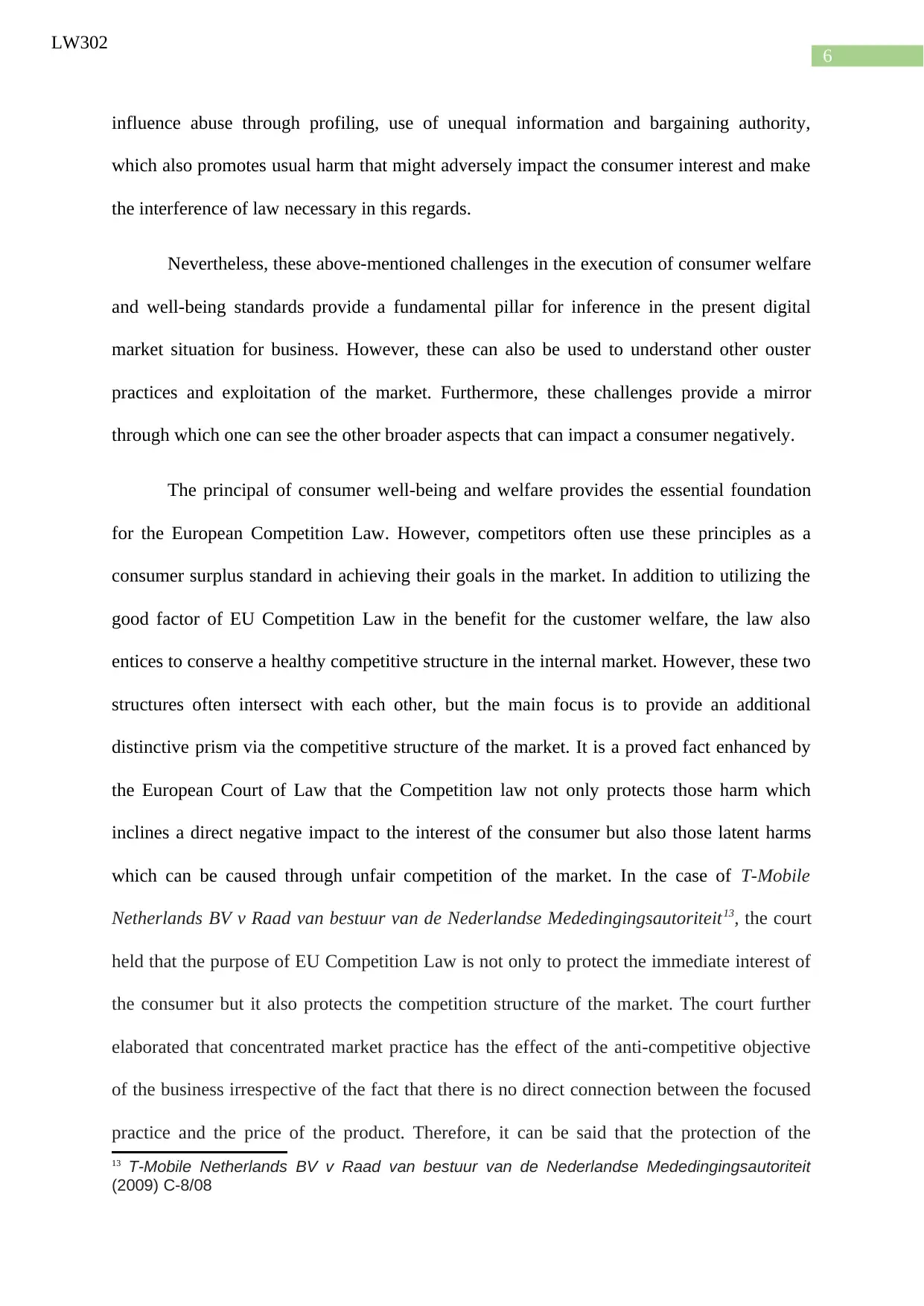
6
LW302
influence abuse through profiling, use of unequal information and bargaining authority,
which also promotes usual harm that might adversely impact the consumer interest and make
the interference of law necessary in this regards.
Nevertheless, these above-mentioned challenges in the execution of consumer welfare
and well-being standards provide a fundamental pillar for inference in the present digital
market situation for business. However, these can also be used to understand other ouster
practices and exploitation of the market. Furthermore, these challenges provide a mirror
through which one can see the other broader aspects that can impact a consumer negatively.
The principal of consumer well-being and welfare provides the essential foundation
for the European Competition Law. However, competitors often use these principles as a
consumer surplus standard in achieving their goals in the market. In addition to utilizing the
good factor of EU Competition Law in the benefit for the customer welfare, the law also
entices to conserve a healthy competitive structure in the internal market. However, these two
structures often intersect with each other, but the main focus is to provide an additional
distinctive prism via the competitive structure of the market. It is a proved fact enhanced by
the European Court of Law that the Competition law not only protects those harm which
inclines a direct negative impact to the interest of the consumer but also those latent harms
which can be caused through unfair competition of the market. In the case of T-Mobile
Netherlands BV v Raad van bestuur van de Nederlandse Mededingingsautoriteit13, the court
held that the purpose of EU Competition Law is not only to protect the immediate interest of
the consumer but it also protects the competition structure of the market. The court further
elaborated that concentrated market practice has the effect of the anti-competitive objective
of the business irrespective of the fact that there is no direct connection between the focused
practice and the price of the product. Therefore, it can be said that the protection of the
13 T-Mobile Netherlands BV v Raad van bestuur van de Nederlandse Mededingingsautoriteit
(2009) C-8/08
LW302
influence abuse through profiling, use of unequal information and bargaining authority,
which also promotes usual harm that might adversely impact the consumer interest and make
the interference of law necessary in this regards.
Nevertheless, these above-mentioned challenges in the execution of consumer welfare
and well-being standards provide a fundamental pillar for inference in the present digital
market situation for business. However, these can also be used to understand other ouster
practices and exploitation of the market. Furthermore, these challenges provide a mirror
through which one can see the other broader aspects that can impact a consumer negatively.
The principal of consumer well-being and welfare provides the essential foundation
for the European Competition Law. However, competitors often use these principles as a
consumer surplus standard in achieving their goals in the market. In addition to utilizing the
good factor of EU Competition Law in the benefit for the customer welfare, the law also
entices to conserve a healthy competitive structure in the internal market. However, these two
structures often intersect with each other, but the main focus is to provide an additional
distinctive prism via the competitive structure of the market. It is a proved fact enhanced by
the European Court of Law that the Competition law not only protects those harm which
inclines a direct negative impact to the interest of the consumer but also those latent harms
which can be caused through unfair competition of the market. In the case of T-Mobile
Netherlands BV v Raad van bestuur van de Nederlandse Mededingingsautoriteit13, the court
held that the purpose of EU Competition Law is not only to protect the immediate interest of
the consumer but it also protects the competition structure of the market. The court further
elaborated that concentrated market practice has the effect of the anti-competitive objective
of the business irrespective of the fact that there is no direct connection between the focused
practice and the price of the product. Therefore, it can be said that the protection of the
13 T-Mobile Netherlands BV v Raad van bestuur van de Nederlandse Mededingingsautoriteit
(2009) C-8/08
Paraphrase This Document
Need a fresh take? Get an instant paraphrase of this document with our AI Paraphraser
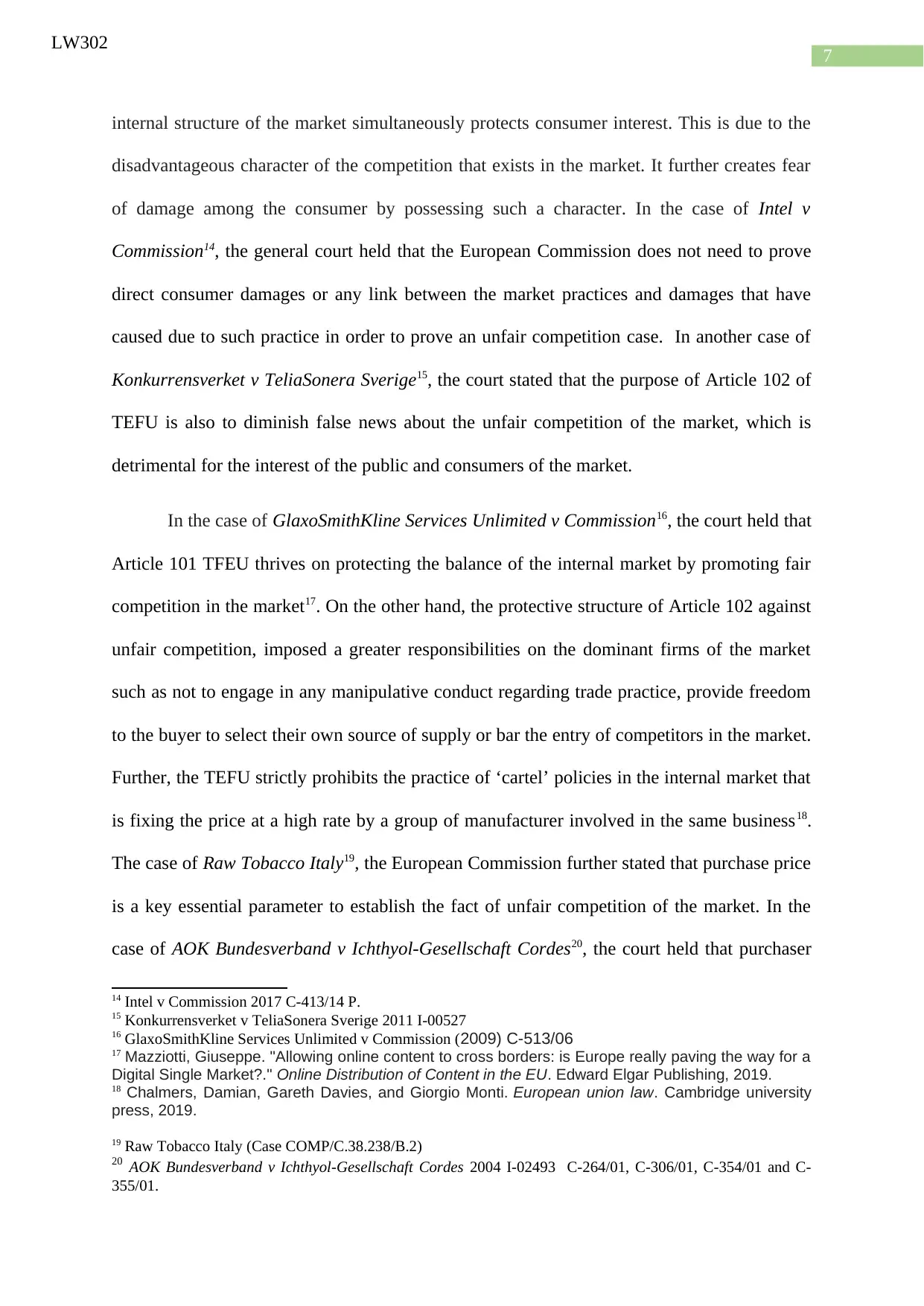
7
LW302
internal structure of the market simultaneously protects consumer interest. This is due to the
disadvantageous character of the competition that exists in the market. It further creates fear
of damage among the consumer by possessing such a character. In the case of Intel v
Commission14, the general court held that the European Commission does not need to prove
direct consumer damages or any link between the market practices and damages that have
caused due to such practice in order to prove an unfair competition case. In another case of
Konkurrensverket v TeliaSonera Sverige15, the court stated that the purpose of Article 102 of
TEFU is also to diminish false news about the unfair competition of the market, which is
detrimental for the interest of the public and consumers of the market.
In the case of GlaxoSmithKline Services Unlimited v Commission16, the court held that
Article 101 TFEU thrives on protecting the balance of the internal market by promoting fair
competition in the market17. On the other hand, the protective structure of Article 102 against
unfair competition, imposed a greater responsibilities on the dominant firms of the market
such as not to engage in any manipulative conduct regarding trade practice, provide freedom
to the buyer to select their own source of supply or bar the entry of competitors in the market.
Further, the TEFU strictly prohibits the practice of ‘cartel’ policies in the internal market that
is fixing the price at a high rate by a group of manufacturer involved in the same business18.
The case of Raw Tobacco Italy19, the European Commission further stated that purchase price
is a key essential parameter to establish the fact of unfair competition of the market. In the
case of AOK Bundesverband v Ichthyol-Gesellschaft Cordes20, the court held that purchaser
14 Intel v Commission 2017 C-413/14 P.
15 Konkurrensverket v TeliaSonera Sverige 2011 I-00527
16 GlaxoSmithKline Services Unlimited v Commission (2009) C-513/06
17 Mazziotti, Giuseppe. "Allowing online content to cross borders: is Europe really paving the way for a
Digital Single Market?." Online Distribution of Content in the EU. Edward Elgar Publishing, 2019.
18 Chalmers, Damian, Gareth Davies, and Giorgio Monti. European union law. Cambridge university
press, 2019.
19 Raw Tobacco Italy (Case COMP/C.38.238/B.2)
20 AOK Bundesverband v Ichthyol-Gesellschaft Cordes 2004 I-02493 C-264/01, C-306/01, C-354/01 and C-
355/01.
LW302
internal structure of the market simultaneously protects consumer interest. This is due to the
disadvantageous character of the competition that exists in the market. It further creates fear
of damage among the consumer by possessing such a character. In the case of Intel v
Commission14, the general court held that the European Commission does not need to prove
direct consumer damages or any link between the market practices and damages that have
caused due to such practice in order to prove an unfair competition case. In another case of
Konkurrensverket v TeliaSonera Sverige15, the court stated that the purpose of Article 102 of
TEFU is also to diminish false news about the unfair competition of the market, which is
detrimental for the interest of the public and consumers of the market.
In the case of GlaxoSmithKline Services Unlimited v Commission16, the court held that
Article 101 TFEU thrives on protecting the balance of the internal market by promoting fair
competition in the market17. On the other hand, the protective structure of Article 102 against
unfair competition, imposed a greater responsibilities on the dominant firms of the market
such as not to engage in any manipulative conduct regarding trade practice, provide freedom
to the buyer to select their own source of supply or bar the entry of competitors in the market.
Further, the TEFU strictly prohibits the practice of ‘cartel’ policies in the internal market that
is fixing the price at a high rate by a group of manufacturer involved in the same business18.
The case of Raw Tobacco Italy19, the European Commission further stated that purchase price
is a key essential parameter to establish the fact of unfair competition of the market. In the
case of AOK Bundesverband v Ichthyol-Gesellschaft Cordes20, the court held that purchaser
14 Intel v Commission 2017 C-413/14 P.
15 Konkurrensverket v TeliaSonera Sverige 2011 I-00527
16 GlaxoSmithKline Services Unlimited v Commission (2009) C-513/06
17 Mazziotti, Giuseppe. "Allowing online content to cross borders: is Europe really paving the way for a
Digital Single Market?." Online Distribution of Content in the EU. Edward Elgar Publishing, 2019.
18 Chalmers, Damian, Gareth Davies, and Giorgio Monti. European union law. Cambridge university
press, 2019.
19 Raw Tobacco Italy (Case COMP/C.38.238/B.2)
20 AOK Bundesverband v Ichthyol-Gesellschaft Cordes 2004 I-02493 C-264/01, C-306/01, C-354/01 and C-
355/01.
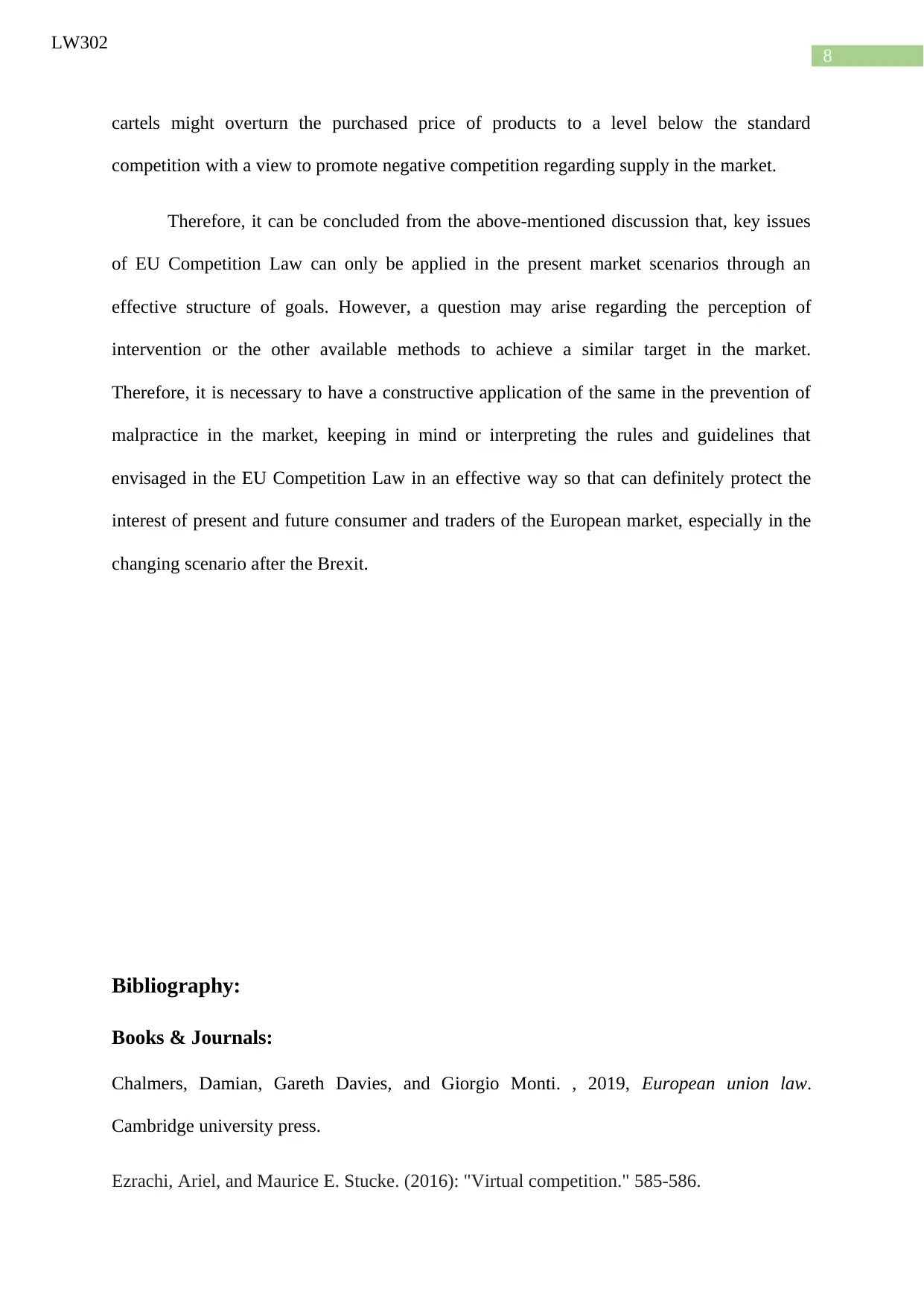
8
LW302
cartels might overturn the purchased price of products to a level below the standard
competition with a view to promote negative competition regarding supply in the market.
Therefore, it can be concluded from the above-mentioned discussion that, key issues
of EU Competition Law can only be applied in the present market scenarios through an
effective structure of goals. However, a question may arise regarding the perception of
intervention or the other available methods to achieve a similar target in the market.
Therefore, it is necessary to have a constructive application of the same in the prevention of
malpractice in the market, keeping in mind or interpreting the rules and guidelines that
envisaged in the EU Competition Law in an effective way so that can definitely protect the
interest of present and future consumer and traders of the European market, especially in the
changing scenario after the Brexit.
Bibliography:
Books & Journals:
Chalmers, Damian, Gareth Davies, and Giorgio Monti. , 2019, European union law.
Cambridge university press.
Ezrachi, Ariel, and Maurice E. Stucke. (2016): "Virtual competition." 585-586.
LW302
cartels might overturn the purchased price of products to a level below the standard
competition with a view to promote negative competition regarding supply in the market.
Therefore, it can be concluded from the above-mentioned discussion that, key issues
of EU Competition Law can only be applied in the present market scenarios through an
effective structure of goals. However, a question may arise regarding the perception of
intervention or the other available methods to achieve a similar target in the market.
Therefore, it is necessary to have a constructive application of the same in the prevention of
malpractice in the market, keeping in mind or interpreting the rules and guidelines that
envisaged in the EU Competition Law in an effective way so that can definitely protect the
interest of present and future consumer and traders of the European market, especially in the
changing scenario after the Brexit.
Bibliography:
Books & Journals:
Chalmers, Damian, Gareth Davies, and Giorgio Monti. , 2019, European union law.
Cambridge university press.
Ezrachi, Ariel, and Maurice E. Stucke. (2016): "Virtual competition." 585-586.
⊘ This is a preview!⊘
Do you want full access?
Subscribe today to unlock all pages.

Trusted by 1+ million students worldwide
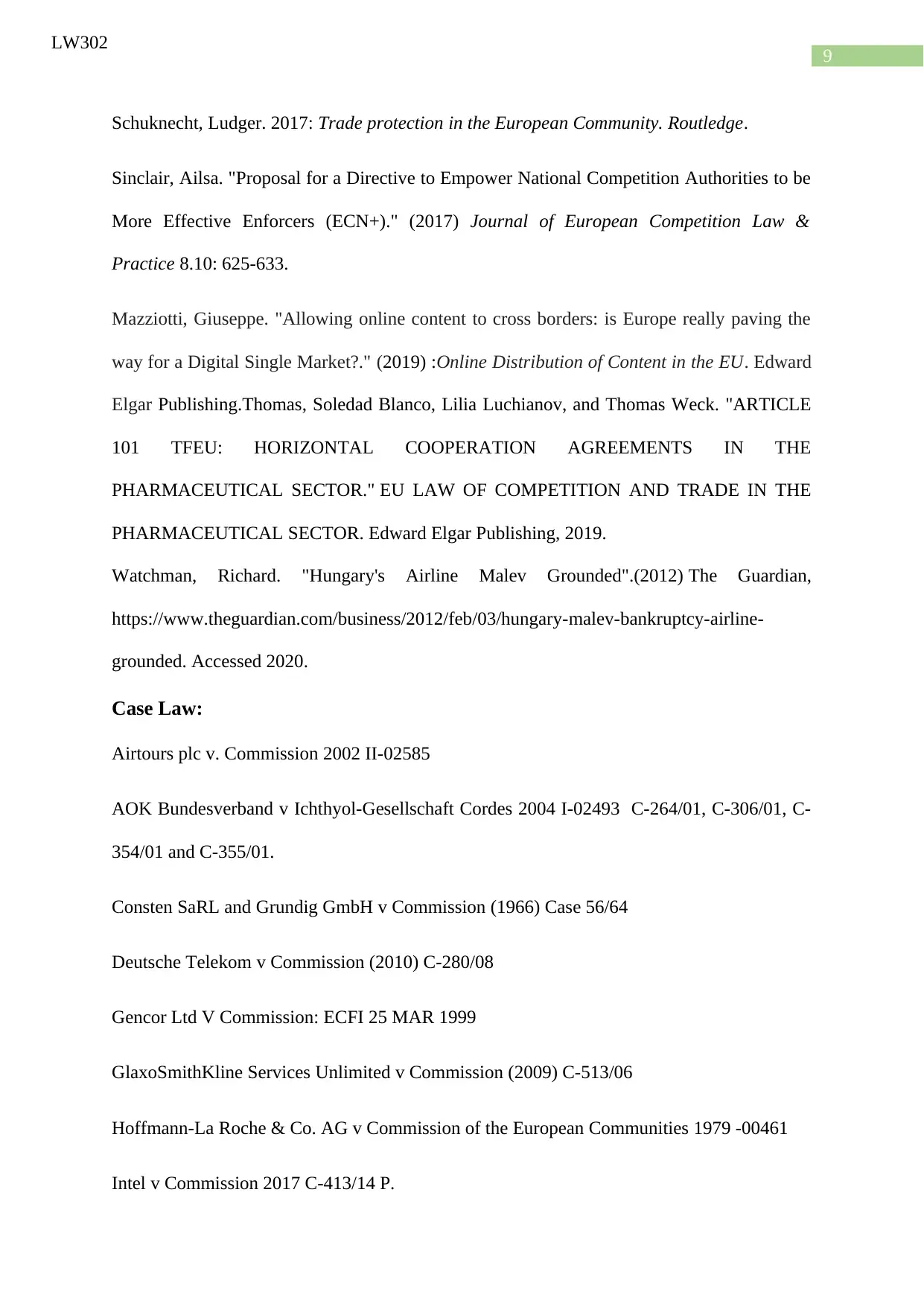
9
LW302
Schuknecht, Ludger. 2017: Trade protection in the European Community. Routledge.
Sinclair, Ailsa. "Proposal for a Directive to Empower National Competition Authorities to be
More Effective Enforcers (ECN+)." (2017) Journal of European Competition Law &
Practice 8.10: 625-633.
Mazziotti, Giuseppe. "Allowing online content to cross borders: is Europe really paving the
way for a Digital Single Market?." (2019) :Online Distribution of Content in the EU. Edward
Elgar Publishing.Thomas, Soledad Blanco, Lilia Luchianov, and Thomas Weck. "ARTICLE
101 TFEU: HORIZONTAL COOPERATION AGREEMENTS IN THE
PHARMACEUTICAL SECTOR." EU LAW OF COMPETITION AND TRADE IN THE
PHARMACEUTICAL SECTOR. Edward Elgar Publishing, 2019.
Watchman, Richard. "Hungary's Airline Malev Grounded".(2012) The Guardian,
https://www.theguardian.com/business/2012/feb/03/hungary-malev-bankruptcy-airline-
grounded. Accessed 2020.
Case Law:
Airtours plc v. Commission 2002 II-02585
AOK Bundesverband v Ichthyol-Gesellschaft Cordes 2004 I-02493 C-264/01, C-306/01, C-
354/01 and C-355/01.
Consten SaRL and Grundig GmbH v Commission (1966) Case 56/64
Deutsche Telekom v Commission (2010) C-280/08
Gencor Ltd V Commission: ECFI 25 MAR 1999
GlaxoSmithKline Services Unlimited v Commission (2009) C-513/06
Hoffmann-La Roche & Co. AG v Commission of the European Communities 1979 -00461
Intel v Commission 2017 C-413/14 P.
LW302
Schuknecht, Ludger. 2017: Trade protection in the European Community. Routledge.
Sinclair, Ailsa. "Proposal for a Directive to Empower National Competition Authorities to be
More Effective Enforcers (ECN+)." (2017) Journal of European Competition Law &
Practice 8.10: 625-633.
Mazziotti, Giuseppe. "Allowing online content to cross borders: is Europe really paving the
way for a Digital Single Market?." (2019) :Online Distribution of Content in the EU. Edward
Elgar Publishing.Thomas, Soledad Blanco, Lilia Luchianov, and Thomas Weck. "ARTICLE
101 TFEU: HORIZONTAL COOPERATION AGREEMENTS IN THE
PHARMACEUTICAL SECTOR." EU LAW OF COMPETITION AND TRADE IN THE
PHARMACEUTICAL SECTOR. Edward Elgar Publishing, 2019.
Watchman, Richard. "Hungary's Airline Malev Grounded".(2012) The Guardian,
https://www.theguardian.com/business/2012/feb/03/hungary-malev-bankruptcy-airline-
grounded. Accessed 2020.
Case Law:
Airtours plc v. Commission 2002 II-02585
AOK Bundesverband v Ichthyol-Gesellschaft Cordes 2004 I-02493 C-264/01, C-306/01, C-
354/01 and C-355/01.
Consten SaRL and Grundig GmbH v Commission (1966) Case 56/64
Deutsche Telekom v Commission (2010) C-280/08
Gencor Ltd V Commission: ECFI 25 MAR 1999
GlaxoSmithKline Services Unlimited v Commission (2009) C-513/06
Hoffmann-La Roche & Co. AG v Commission of the European Communities 1979 -00461
Intel v Commission 2017 C-413/14 P.
Paraphrase This Document
Need a fresh take? Get an instant paraphrase of this document with our AI Paraphraser
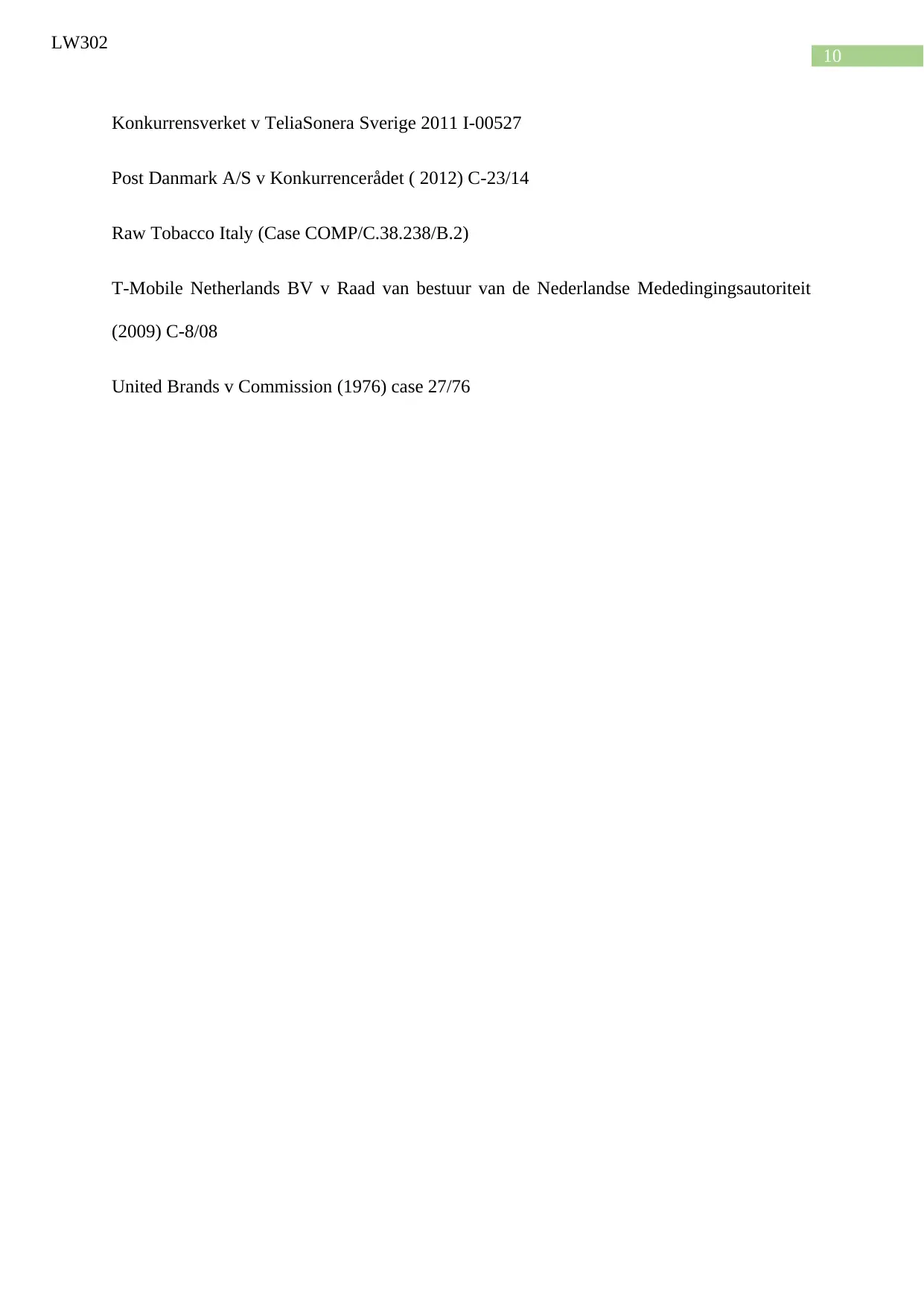
10
LW302
Konkurrensverket v TeliaSonera Sverige 2011 I-00527
Post Danmark A/S v Konkurrencerådet ( 2012) C-23/14
Raw Tobacco Italy (Case COMP/C.38.238/B.2)
T-Mobile Netherlands BV v Raad van bestuur van de Nederlandse Mededingingsautoriteit
(2009) C-8/08
United Brands v Commission (1976) case 27/76
LW302
Konkurrensverket v TeliaSonera Sverige 2011 I-00527
Post Danmark A/S v Konkurrencerådet ( 2012) C-23/14
Raw Tobacco Italy (Case COMP/C.38.238/B.2)
T-Mobile Netherlands BV v Raad van bestuur van de Nederlandse Mededingingsautoriteit
(2009) C-8/08
United Brands v Commission (1976) case 27/76
1 out of 11
Related Documents
Your All-in-One AI-Powered Toolkit for Academic Success.
+13062052269
info@desklib.com
Available 24*7 on WhatsApp / Email
![[object Object]](/_next/static/media/star-bottom.7253800d.svg)
Unlock your academic potential
Copyright © 2020–2026 A2Z Services. All Rights Reserved. Developed and managed by ZUCOL.





